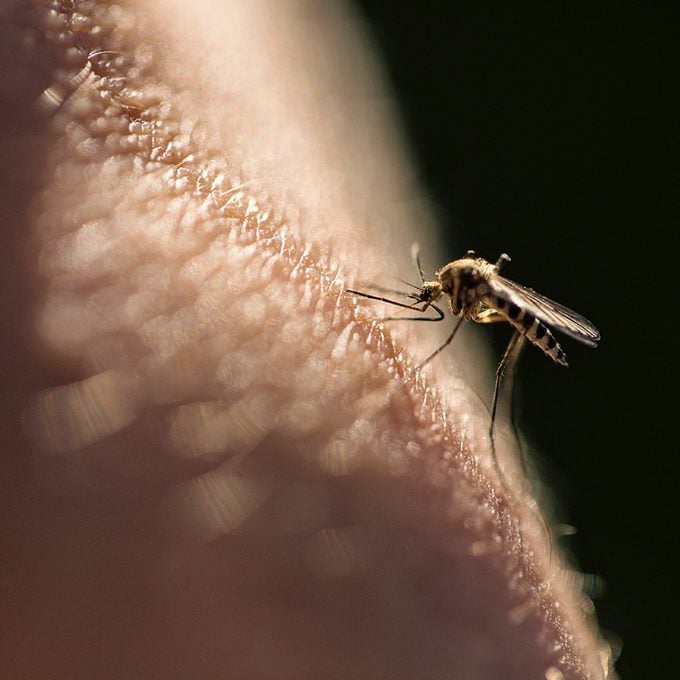Here’s What Happens When You Get a Bug Bite, Say Medical Doctors—Plus, Why You Shouldn’t Scratch It
Updated: Aug. 01, 2023
Why does scratching that itch from a bug bite feel so good? Medical doctors say there are health reasons to sit on your hands!—with a list of friendlier anti-itch remedies to give you relief.

You can run, but you can’t hide from mosquitoes. In fact, running might make it worse—mosquitoes love it when you work up a sweat—although it’s not so much the sweat that attracts them as the carbon dioxide you’re exhaling as you exercise. (Then there are all the other “harmless” bugs you didn’t know could bite you.)
The reality is, insect attention can be inevitable…but why do bug bites itch so terribly—and, how could that oh-so-satisfying scratching be bad? Doctors gave us answers.
For wellness wisdom delivered daily, get The Healthy @Reader’s Digest newsletter
Here’s what happens when you get a bug bite, says a licensed medical doctor
Fun fact: It’s actually not the bug bite itself that causes the itching, swelling, redness, and pain—the real culprit is your body’s own immune response to the bite.
When a mosquito bites, that nasty little nuisance pierces your skin with its straw-like mouth, and then the mosquito “injects saliva into your skin,” according to Jorge Parada MD, MPH, FACP, FIDSA. Dr. Parada serves as medical adviser to the National Pest Management Association and explains that the mosquito’s saliva contains proteins that your body wisely recognizes as intruders. Your immune system goes on high alert, releasing a chemical called histamine that activates your immune cells to flow freely toward the site of the bite.
Histamine is what causes the bug bite to itch, swell, and turn red. This is why doctors often recommend taking an antihistamine medication to relieve the symptoms of bug bites.
This immune response process isn’t unique to mosquitoes. It takes place whether you’ve been bitten or stung by bees, ticks, chiggers, bedbugs or any number of bitey bugs.
8 Bug Bites That Might Need Medical Attention—Now
Here’s why your bug bites get so itchy
Different people have different levels of response to bug bites, based on their unique immune systems. This means some people will be super-reactors, getting large bumps and lots of itching, while others will barely react and may hardly notice the bite…lucky!
This complicated process is actually a healthy one. If you had a weak immune system, you would have no response, says dermatologist Jennifer T. Haley, MD, FAAD—and that could leave you open to infection (like this diabetic woman whose ant bite almost resulted in an amputation). Healthy as the immune response can be, however, it can be incredibly irritating—especially if your bite is itchy.
(Here’s how how you can identify these nine common bug bites.)
4 things that happen to your body when you scratch a bug bite
Tempting as it may be, try to resist scratching that itch, recommends Rosmy Barrios, MD, a medical doctor who specializes in aesthetic medicine, including skincare. “Itching a bug bite can feel nearly irresistible, but it only provides temporary relief,” Dr. Barrios says. “In the long run, it can cause more harm than good.”
According to Dr. Barrios and the other medical experts we spoke with, itching a bug bite actually makes it worse. Scratching a bug bite will:
- Stir up the mosquito (or other bug) saliva, which only increases the histamine response—worsening your symptoms over time.
- Damage already-irritated skin, increasing the redness and swelling.
- Increase your risk of infection if you break the skin. You carry a lot of bacteria under your fingernails, which can then enter your body through the open wound.
- Increase the risk of scarring and may make the bite take longer to heal.
Not sure what’s causing the itch? Here’s what you need to know about chiggers or bed bugs?, chiggers or scabies?, and chiggers or mosquitoes?
Five ways to stop a bug bite from itching, say doctors
Dr. Barrios suggests anytime you experience a bug bite, you should start by cleaning the affected area with mild soap and water to reduce the risk of infection.
If you can’t resist the urge to scratch, try these safer alternatives from our doctors:
Cold therapy
Pouring cool water over the bite, covering the bite with a cold washcloth, or rubbing ice for a few seconds over the bite can all help reduce swelling and temporarily relieve the itchiness.
Pressure
Pressing down firmly over the bite with a clean hand or towel isn’t as satisfying as scratching, but it can help reduce the itch, especially if you feel like you have to touch it.
Antihistamines
One of the most effective tools for fighting itching are over-the-counter antihistamines, like Benadryl. You might already have some sitting on your shelf right now.
Anti-inflammatory medications
An over-the-counter anti-inflammatory medication, like ibuprofen or naproxen sodium, can reduce the swelling and inflammation tied to itching. (Though you want to be sure it’s safe and appropriate for you to take these, so speak with a doctor if you have any question—and please don’t administer to a child without getting a licensed professional’s opinion, even if that means a brief chat with the pharmacist.)
Creams
On and around the affected area, try rubbing aloe vera lotion, calamine lotion, or an over-the-counter one percent hydrocortisone cream. Or, try one of these natural remedies for mosquito bites.
Here’s What Spider Bites Look Like—and When to Call the Doctor
What to do if you itch a bug bite until it bleeds
If you do end up itching and the spot bleeds, wash it gently with soap and water, then cover with a light bandage (this will help protect it from dirt, germs, and your fingers!).
Next, watch for signs of infection: Signs of infection include pus, increased redness, warmth, spreading red streaks or a rash; or if you develop systemic symptoms like fever or muscle aches. You may need antibiotics if the infection is prolonged or severe, says Dheeraj Taranath, DO, a regional medical director of MedExpress.
Bug bites can also cause allergic reactions and transmit diseases like malaria, West Nile virus, Lyme disease—all of which may need medical treatment, Dr. Barrios says. If you have any concerns about a bug bite, don’t hesitate to call your doctor, they will be able to help you evaluate it and decide if you need to be seen.
Get The Healthy @Reader’s Digest newsletter and follow The Healthy on Facebook and Instagram. Keep reading:
- The 6 Most Effective Products to Help You Avoid Mosquito Bites, According to Reviews
- Here’s How Often You Should Actually Take Your Blood Pressure, According to a Cardiologist
- I Ate Pizza Every Day for a Week—Here’s What Happened
- The 3 Best Hydrating Beverages That Aren’t Water, from a Certified Sports Dietitian
- “Am I Burnt Out?” This Medical Doctor’s 2-Minute Quiz Provides Burnout Symptoms, Answers and Relief
Additional writing and reporting by Charlotte Hilton-Andersen.

